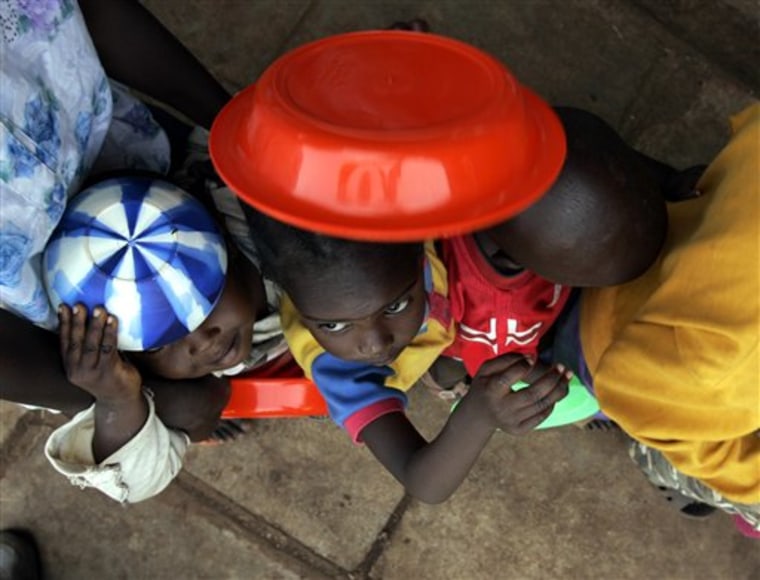Young men from rival ethnic groups hunted each other through the streets of a western Kenyan town Saturday, burning houses and blocking roads a day after the country's political foes agreed to try to end weeks of violence.
Western Kenya has been at the center of fighting that has engulfed the country since an election that foreign and local observers say was rigged — and Saturday's clashes underscored how difficult it may be to end the bloodletting, which has left hundreds dead.
Both men who signed Friday's deal were still talking tough. President Mwai Kibaki accused his opponents of orchestrating the violence, and Raila Odinga, the opposition leader who says the presidency was stolen from him, said Kibaki's "aggressive statements" were undermining efforts to quell the fighting.
With the two sides trading blame, as they have done repeatedly since the outset of the crisis, the fighting continued unabated Saturday with members of Kenya's numerous tribes going after people from rival ethnic groups.
A Pentecostal church in the western town of Eldoret was burned overnight, and only smoldering ruins were left by daybreak. The pastor's nephew, Peter Ndungu, said the church was burned because his aunt was from Kibaki's Kikuyu tribe.
Terrified Kenyans, meanwhile, continued to pour into camps for the displaced.
"It's unpredictable," said 28-year-old Joseph Njoroge, a Kikuyu, as he strained to push a cart piled high with furniture along a road lined by burnt-out homes and businesses.
Men armed with bow and arrows came to his house, threatening to kill him in retaliation for the slaying of an opposition lawmaker Thursday. Police say that killing — the second of an opposition lawmaker in a week — was tied to a love triangle, but opposition supporters say it was political.
"There's no way you can stay and wait for those guys to come back," Njoroge said.
Tribal gangs clash
In the nearby town of Kericho, gangs of young men from the Kalenjin, Kikuyu and Kisii tribes hunted each other, setting homes ablaze and blockading roads with burning tires, said a police officer who spoke on condition of anonymity because he wasn't authorized to speak to reporters.
Police who managed to get near Kericho found themselves outmanned and overwhelmed, even after being reinforced by paramilitary officers, the officer said, adding that one mob had stolen four guns with ammunition during running battles with police the day before.
Overnight in the same town, Kalenjin youths killed four Kikuyu civilians and a policeman, said the officer.
In the town of Keroka — which lies along the line dividing Kalejin territory from Kisii lands — police fired tear gas to disperse Kisii youths who blocked roads with burning debris and shouted that the Kalenjin must leave or risk death, said another officer, who refused to be named because he wasn't authorized to speak with the media.
Such clashes have left more than 800 people dead and forced 300,000 from their homes since the Dec. 27 election, which pitted Kibaki, the incumbent, against Odinga. The violence has often degenerated into ethnic clashes over decades-old grudges about land and resources, with much of the anger and attacks aimed at the Kikuyu, who are resented for their long domination of politics and the economy.
Settling an agreement
Friday's deal was mediated by Kofi Annan, the former U.N. secretary-general, and it laid out a plan to end the violence before moving onto the tougher political issues at the root of the fighting. Annan said it should take two weeks to decide the immediate crisis and up to a year for the deeper problems.
The agreement calls for illegal militias to be disbanded and for investigation of all crimes connected to the violence, including those allegedly committed by the police, who have killed scores of people.
Even as the deal was reached in Nairobi, Kibaki was telling African leaders at a summit in neighboring Ethiopia that the opposition was orchestrating the violence.
Kibaki repeated his claim that he was rightfully elected and suggested his opponents take their grievances over the election to the courts. The opposition has already said it cannot go to courts loaded with Kibaki's allies.
On Saturday, Odinga reacted angrily to Kibaki's speech — "aggressive statements ... basically undermine the spirit of mediation," he told reporters in Nairobi.
On Friday, he had made similar charges that the government was directing the violence.
